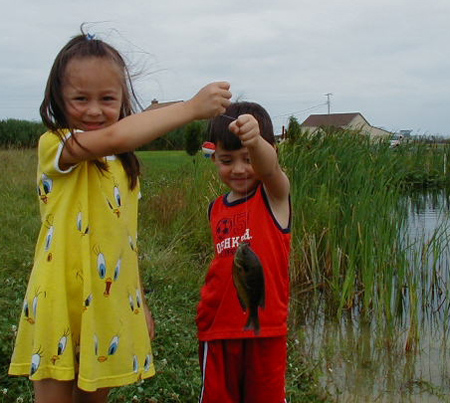Many small “farm” ponds in Delaware provide important recreational opportunities. Children may catch their first bluegill from such a pond. Ponds provide aesthetic beauty, irrigation, fire safety in rural areas, and wildlife habitat.
Fisheries Office
302-735-8650
Wildlife can use ponds for feeding and nesting habitat, resting areas, and water sources. Adding nest boxes can improve the chance of housing woodducks or bluebirds and other users of boxes.
Although ponds serve many useful purposes, they sometimes have problems with aquatic weeds or unbalanced fish populations. For those cases, the Division of Fish and Wildlife has developed helpful publications with ideas and guidance for pond owners.
 A properly stocked and managed pond will provide many years of fishing opportunities. In Delaware, recommended species include largemouth bass and bluegill. A list of Fish Suppliers for warmwater ponds is available. Occasionally, channel catfish are added as another catch-able species. Species that don’t do well in small ponds (less than 5 acres) are crappies, bullhead catfish, and yellow perch.
A properly stocked and managed pond will provide many years of fishing opportunities. In Delaware, recommended species include largemouth bass and bluegill. A list of Fish Suppliers for warmwater ponds is available. Occasionally, channel catfish are added as another catch-able species. Species that don’t do well in small ponds (less than 5 acres) are crappies, bullhead catfish, and yellow perch.
Common carp and gizzard shad are considered undesirable and Delaware ponds are too warm for freshwater trout. Two publications, Management of Warmwater Ponds and Best Management Practices for Your Small Pond will help pond owners create and maintain good fishing. The Best Management Practices publication offers solutions for prolonging the life of your pond and preventing some common problems.
Pond owners can use a seine net to sample fish populations and determine the balance of fish species in their pond.
If weed problems do crop up in your pond, there are options depending on the weed species. For algae prevention, one of the easiest and most inexpensive methods is the use of barley straw. This has proven effective for some ponds but must be applied as a preventive measure in February or March. Once algae covers your pond in mid-summer, other control measures are necessary as described in Controlling Algae in Delaware Ponds.
Rooted and floating plants such as hydrilla or duckweed require different methods. One such tool is the use of triploid grass carp. Because this is a non-native species which can have negative effects on Delaware’s natural communities, a permit for their possession is required. The Briefing Report on Grass Carp and the Grass Carp Policy explain many of the issues involved with the use of grass carp. This weedeating fish does not feed on all plant species, so identification of the problem plant is critical. Both chemical and mechanical methods are also tools for control of some plant species.
For additional technical assistance or a grass carp permit application, contact the Fisheries Office at the Aquatic Resources Education Center in Smyrna, at 302-735-8650.
For wildlife habitat enhancement information, contact the Private Lands Assistance Program at 302-735-3600.
Related Topics: dfw, fish, fish and wildlife, fishing, land owner, outdoors, outdoors and recreation, pond, recreation